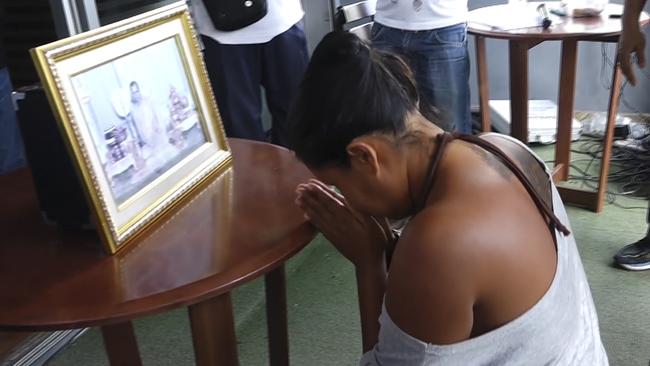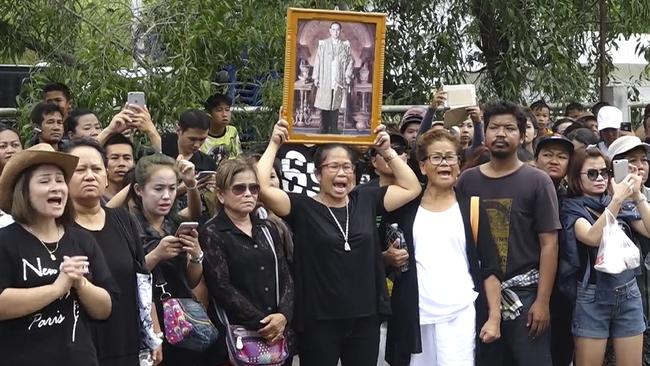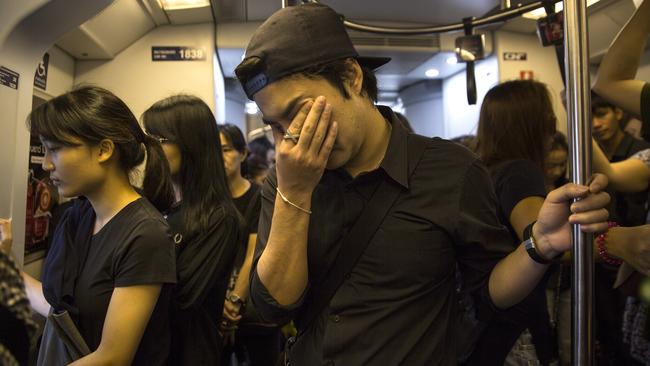Grief over death of Thai king turns to mob hysteria
Once the collective anger escalated, not even an abject gesture of humility could calm the crowd.

Once the collective anger escalated, not even an abject gesture of humility could calm the crowd.
On Sunday 43-year-old Koh Samui woman Umaporn Sarasat prostrated herself before a portrait of Thailand’s late King Bhumibol, the country’s revered 88-year-old monarch who died last Thursday, and begged forgiveness for allegedly insulting his name in a social media post.
It was not enough. Hundreds of angry mourners outside a local police station would disperse only after police promised to question and possibly charge the woman.
Hours earlier a crowd blocked the road outside a roti shop in Phangnga, southern Thailand, demanding the arrest of the owner’s son for similar transgressions.
On Friday night a 400-strong crowd mobbed a well-known Phuket soy milk shop after the son of the owner posted what even police believed to be an innocuous statement about the king’s passing.

“To be born, to live and to die is normal,” Suthee Arammetapongsa wrote on his Facebook page on Thursday night, quoting a well-known Buddhist phrase. “Why get so worked up?” he added.
His comments were an early lightning rod for grief-stricken Thais looking for an outlet, and the family has since been forced to flee under threat of violence if they return.
Not even a desperate plea for forgiveness posted on the 30-year-old’s Facebook page has ameliorated his accusers.
“It is like everybody is watching each other, whether you’re sad enough, or your dress is black enough, whether you express your ideas sadly enough on social media,” said Chulangkom University political scientist Pitch Pongsawat.
Yingcheep Atchanont from iLaw, an organisation that documents freedom of expression violations in Thailand, said the situation was too sensitive and volatile to reach out to those who may face lese majeste charges in coming days and weeks.
“I don’t think we should try to contact them directly right now. I can do only prayer for them to survive until everything is calm,” he told The Australian.
“As civil society, we don’t feel secure right now so we have to keep our heads down.”
Since the King’s death plunged Thailand into 30 days of mourning — a year for public servants — many Thais have been acutely sensitive to potential insults to the monarchy.
Violations of the country’s strict lese majeste law carry a maximum sentence of 15 years for each count of insulting the king, queen, heir or regent.
But local media has also reported numerous cases of people being harassed for not wearing black.
In one incident reported by English-language news site Khaosod, a truck driver berated a Bangkok motorbike courier at traffic lights for wearing his green uniform and was pacified only when the courier unzipped his jacket to prove he was wearing black underneath.
The escalating tensions prompted the government to ask all Thais to refrain from posting “inappropriate content”, even as the National Broadcasting and Telecommunications Commission issued instructions on how to report such cases. The government has also sought to clarify its instructions on mourning attire after a rush on black clothing, and concerns that people who could not afford to buy new clothes might face persecution for it.
Australia and Britain have issued travel advisories urging citizens to avoid behaviour potentially deemed disrespectful.
But in its time of grief, Thailand’s heightened sensitivity has manifested in other ways too.
On Sunday, the government issued a statement “deploring” foreign media for reporting only thousands of mourners had gathered to mourn the death of the king, instead of millions.
“The actual number is far greater than what was reported,” it said, adding such inaccurate reporting was “not only unethical but insensitive”.
Millions of Thais are genuinely struggling to deal with the loss of a monarch long seen as central to the nation’s stability and identity, their grief perhaps compounded by questions over the nation’s future following Crown Prince Vajiralongkorn’s decision to defer his own coronation.
So much so that the country’s health department has set up a counselling hotline as well as eight mobile medical clinics stocked with water and medicines, and staffed with medics, psychiatrists and psychiatric nurses, near the Grand Palace in Bangkok.
At one mobile clinic psychiatrist Pattarika Ho told The Australian staff had so far seen only a few such cases, but the department was preparing a standard screening process to determine cases of depression and post-traumatic stress disorder.
“We don’t know how long we will be here. We plan to start screening tests maybe after two weeks so people can come and see whether they are clinically depressed,” Dr Ho said.
“Right now it is too soon to diagnose because this is the normal reaction to grief. When the sister of King Bhumibol died we did something similar for more than three months so we may be here for more like a year.”




